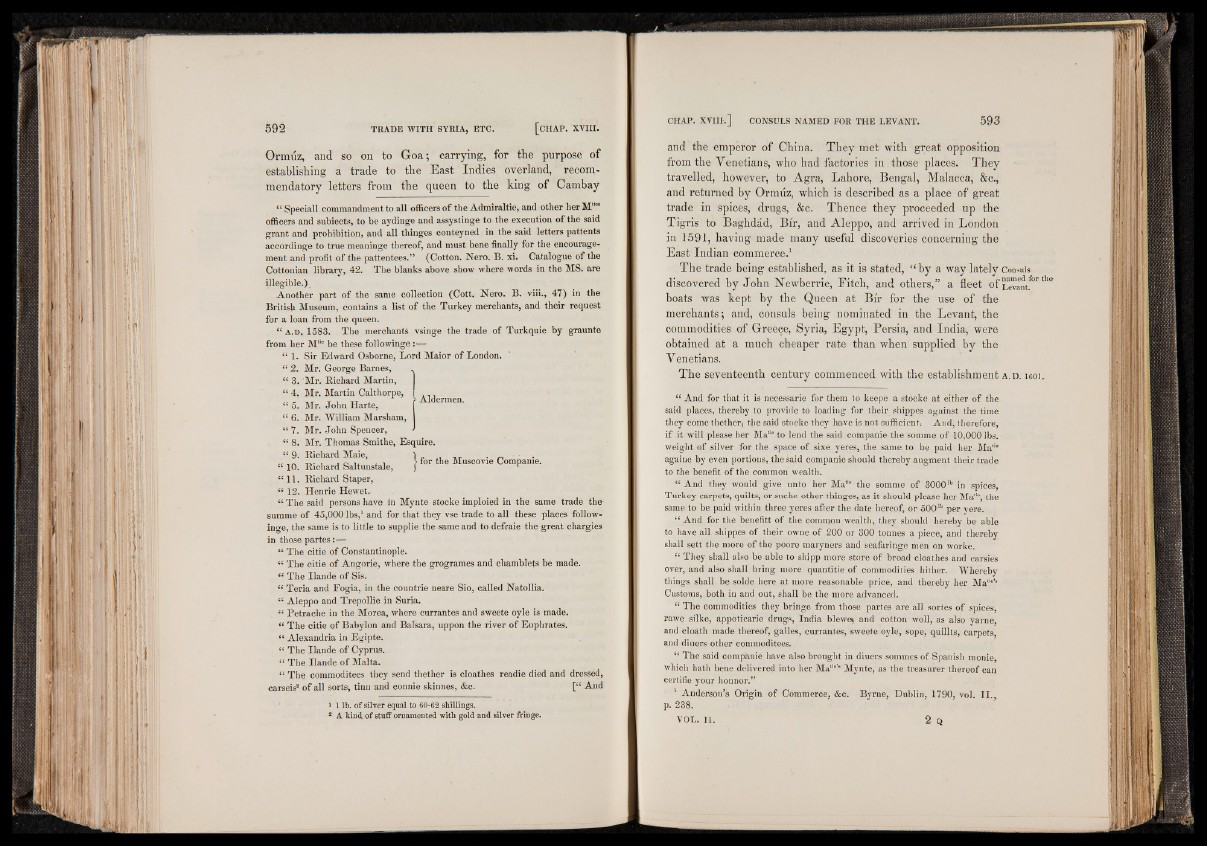
Ormuz, and so on to Goa; carrying, for the purpose of
establishing a trade to the East Indies overland, recommendatory
letters from the queen to the king of Cambay
“ Speciall commandment to all officers of the Admiraltie, and other her M"“
officers and subiects, to be aydinge and assystinge to the execution of the said
grant and prohibition, and all thinges conteyned in the said letters pattents
accordinge to true meaninge thereof, and must bene finally for the encouragement
and profit of the pattentees.” (Cotton. Nero. B. xi. Catalogue of the
Cottonian library, 42. The blanks above show where words in the MS. are
illegible.)
Another part of the same collection (Cott. Nero. B. viii., 47) in the
British Museum, contains a list of the Turkey merchants, and their request
for a loan from the queen.
“ a .d . 1583. The merchants vsinge the trade of Turkquie by graunte
from her Mtie be these followinge ,
“ 1. Sir Edward Osborne, Lord Maior of London.
“ 2. Mr. George Barnes,
“ 3. 'Mr. Richard Martin, 1
“ 4. Mr. Martin Calthorpe, [
“ 5. Mr. John Harte, Aldermen.
! 6. Mr. William Marsham,
“ 7. Mr. John Spencer,
“ 8. Mr. Thomas Smithe, Esquire.
„ “ 9. -Rr.-i ch, ard Maie, 1 H H “ 10. Richardj oS altunstale, j1 for the Muscovie Companie.
“ 11. Richard Staper,
“ 12. Henrie Hewet.
“ The said persons have in Mynte stocke imploied in the same trade the
summe of 45,000 lbs,1 and for that they vse trade to all these places followinge,
the same is to little to supplie the same and to defraie the great chargies
in those partes:—
“ The citie of Constantinople.
“ The citie of Angorie, where the grogrames and chamblets be made.
“ The Uande of Sis.
“ Teria and Fogia, in the countrie neare Sio, called Natollia.
“ Aleppo and Trepollie in Suria.
“ Petrache in the Morea, where currantes and sweete oyle is made.
“ The citie of Babylon and Balsara, uppon the river of Euphrates.
“ Alexandria in Egipte.
“ The Ilande of Cyprus.
“ The Ilande of Malta.
“ The commoditees they send thether is cloathes readie died and dressed,
carseis* of all sorts, tinn and connie skinnes, &c. [“ And
1 lb. of silver equal to 60-62 shillings.
1 A kind of stuff ornamented with gold and silver fringe.
and the emperor of China. They met with great opposition
from the Venetians, who had factories in those places. They
travelled, however, to Agra, Lahore, Bengal, Malacca, &c.,
and returned by Ormuz, which is described as a place of great
trade in spices, drugs, &c. Thence they proceeded up the
Tigris to Baghdad, Bir, and Aleppo, and arrived in London
in 1591, having made many useful discoveries concerning the
East Indian commerce.1
The trade being established, as it is stated, “ by a way lately Consuls
discovered by John Newberrie, Fitch, and others,” a fleet of Levant.f°r the
boats was kept by the Queen at Bir for the use of the
merchants; and, consuls being nominated in the Levant, the
commodities of Greece, Syria, Egypt, Persia, and India, were
obtained at a much cheaper rate than when supplied by the
Venetians.
The seventeenth century commenced with the establishment a . d . aeoi.
“ And for that it is necessarie for them to keepe a stocke at either of the
said places, thereby to provide to loading for their shippes against the time
they come thether, the said stocke they have is not sufficient. And, therefore,
if it will please her Ma‘“ to lend the said companie the somme of 10,000 lbs.
weight of silver for the space of sixe yeres, the same to be paid her Ma*'8
againe by even portions, the said companie should thereby augment their trade
to the benefit of the common wealth.
“ And they would give unto her Ma*'8 the somme of 3000lb in spices,
Turkey carpets, quilts, or suche other thinges, as it should please her Mati0, the
same to be paid within three yeres after the date hereof, or 500lb per yere.
“ And for the benefitt of the common wealth, they should hereby be able
to have all shippes of their owne of 200 or 300 tonnes a piece, and thereby
shall sett the more of the poore maryners and seafaringe men on worke.
“ They shall also be able to shipp more store of broad cloathes and earsies
over, and also shall bring more quantitie of commodities hither. Whereby
things shall be solde here at more reasonable price, and thereby her Ma"8’*
Customs, both in and out, shall be the more advanced.
“ The commodities they bringe from those partes are all sortes of spices,
rawe silke, appoticarie drugs, India blewej and cotton woll, as also yarne,
and cloath made thereof, galles, currantes, sweete oyle, sope, quillts, carpets,
and diuers other commoditees.
“ The said companie have also brought in diuers sommes of Spanish monie,
which hath bene delivered into her Ma*'8’8 Mynte, as the treasurer thereof can
certifie your honnor.”
1 Anderson’s Origin of Commerce, &c. Byrne, Dublin, 1790, vol. II.,
p. 238.
VOL. I I. 2 Q